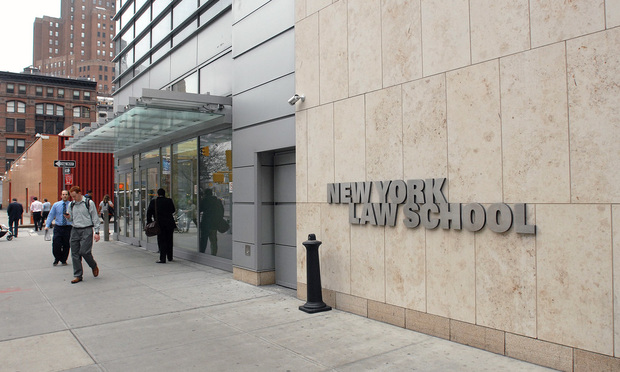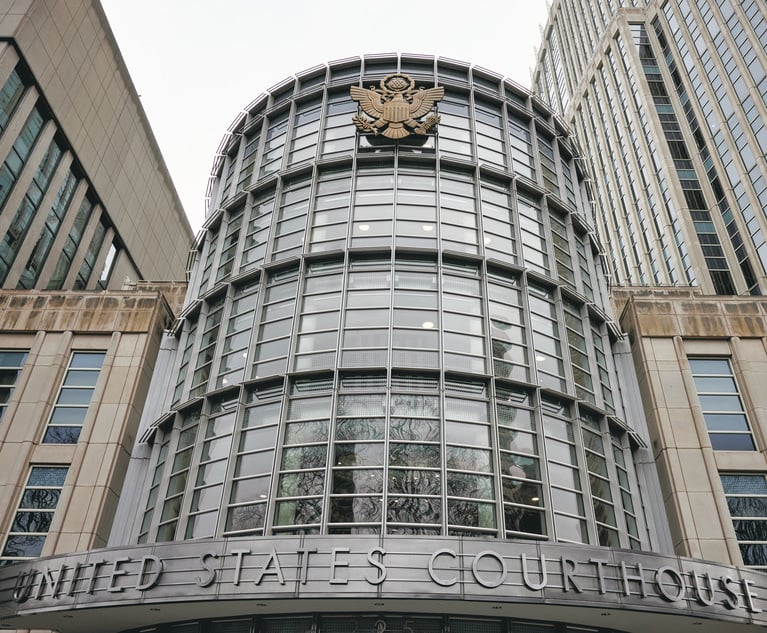New York Law School Adds Religious Training to Its Diversity Program
The Manhattan law school has partnered with the Interfaith Center of New York to give students and attorneys a basis in religion so they can better represent clients of faith.
October 16, 2019 at 02:02 PM
4 minute read
 New York Law School. Photo: Rick Kopstein/ALM
New York Law School. Photo: Rick Kopstein/ALM
New York Law School wants to help students and lawyers better represent religious clients by giving them a foundation in religious literacy that will help them navigate the attorney and client relationship.
The Manhattan law school has partnered with the Interfaith Center of New York for a year-long series of programming aimed at teaching law students and attorneys about religion and how it may surface within the legal context, as well as legal outreach efforts to local religious organizations. Organizers hope the program will continue beyond the initial year.
It's the first such religious diversity program at a law school, according to Henry Goldschmidt, director of programs at the Interfaith Center. Some law schools offer religious liberty clinics, which represent clients in litigation over religious freedoms. And a few law schools, including Fordham University School of Law, offer programming on religious lawyering, which seeks to help law students integrate their personal faith and their professional life. But the new religious diversity initiative has a different focus, which is for attorneys to better understand and represent their clients through a basic familiarity with their religion.
"We are, frankly, more interested in the religious and spiritual background of the clients attorneys are serving," Goldschmidt said. "Our work is to help attorneys of any background, whether they are religious or secular, to help them work more effectively with religiously diverse clients. As far as I know, there is nothing else like that in New York or elsewhere."
The religious diversity initiative has three components. The first component is having each first-year student at New York Law School attend sessions on religious diversity as part of their professional development training, with the first such session starting next week. Those sessions will include conversations with local faith leaders and discussions among students about religion.
Goldschmidt said students will read case studies in which an understanding of religion was integral to an attorney effectively representing their client. For example, they will learn about a divorce case in which an Hasidic man sought full custody of his children because his ex-wife had come out as a lesbian and left the Orthodox Jewish faith, despite a clause in their divorce agreement that the children would be raised Orthodox.
"Regardless of what you think of the merits of his case, or the tension between his religious identity and her sexuality, if you're going to serve him as a client, you need to understand, 'What does it mean to a Hasidic Jew that their children be raised according to certain standards?'" Goldschmidt said.
Similarly, law students will learn about a case in which a Sikh Metropolitan Transit Authority worker successfully fought a policy that he wear an MTA logo on his turban. It's important to understand why a Sikh client would not want to wear a pin on their turban, which is considered a religious garment, Goldschmidt added.
A second component of the program involves training third-year law students to provide legal outreach to religious communities. After receiving religious diversity instruction, the upper-class students will offer "know your rights" sessions to congregations affiliated with the Interfaith Center of New York. The topics may include immigration, domestic violence, nonprofit and small business law, investor protection, and housing rights.
Lastly, the school plans to host a religious diversity and legal practice symposium in March 2020 where attorneys may earn CLE credit to fulfill the diversity, inclusion, and elimination of bias CLE requirement. Attendees will hear remarks from Chief Judge Robert Katzmann of the U.S. Court of Appeals for the Second Circuit, as well as religious leaders, faith-based activists, and attorneys who work with a broad array of religious clients.
Organizers hope the new initiative will fill a gap in the diversity instruction lawyers and law students receive.
"I think it's not something that we speak about," said Swati Parikh, the law school's executive director of public service and pro bono initiatives. "Students aren't taking classes where they are being taught cultural competency in relation to religion. We certainly discuss implicit bias and cultural competency, but it's more in the context of race, ethnicity, and gender. Not so much religion."
This content has been archived. It is available through our partners, LexisNexis® and Bloomberg Law.
To view this content, please continue to their sites.
Not a Lexis Subscriber?
Subscribe Now
Not a Bloomberg Law Subscriber?
Subscribe Now
NOT FOR REPRINT
© 2025 ALM Global, LLC, All Rights Reserved. Request academic re-use from www.copyright.com. All other uses, submit a request to [email protected]. For more information visit Asset & Logo Licensing.
You Might Like
View All
The Met Hires GC of Elite University as Next Legal Chief

NY Appellate Panel Cites Student's Disciplinary History While Sending Negligence Claim Against School District to Trial

'No Evidence'?: Big Law Firms Defend Academic Publishers in EDNY Antitrust Case
3 minute read
'Substantive Deficiencies': Judge Grants Big Law Motion Dismissing Ivy League Price-Fixing Claims
3 minute readTrending Stories
- 1'A Death Sentence for TikTok'?: Litigators and Experts Weigh Impact of Potential Ban on Creators and Data Privacy
- 2Bribery Case Against Former Lt. Gov. Brian Benjamin Is Dropped
- 3‘Extremely Disturbing’: AI Firms Face Class Action by ‘Taskers’ Exposed to Traumatic Content
- 4State Appeals Court Revives BraunHagey Lawsuit Alleging $4.2M Unlawful Wire to China
- 5Invoking Trump, AG Bonta Reminds Lawyers of Duties to Noncitizens in Plea Dealing
Who Got The Work
J. Brugh Lower of Gibbons has entered an appearance for industrial equipment supplier Devco Corporation in a pending trademark infringement lawsuit. The suit, accusing the defendant of selling knock-off Graco products, was filed Dec. 18 in New Jersey District Court by Rivkin Radler on behalf of Graco Inc. and Graco Minnesota. The case, assigned to U.S. District Judge Zahid N. Quraishi, is 3:24-cv-11294, Graco Inc. et al v. Devco Corporation.
Who Got The Work
Rebecca Maller-Stein and Kent A. Yalowitz of Arnold & Porter Kaye Scholer have entered their appearances for Hanaco Venture Capital and its executives, Lior Prosor and David Frankel, in a pending securities lawsuit. The action, filed on Dec. 24 in New York Southern District Court by Zell, Aron & Co. on behalf of Goldeneye Advisors, accuses the defendants of negligently and fraudulently managing the plaintiff's $1 million investment. The case, assigned to U.S. District Judge Vernon S. Broderick, is 1:24-cv-09918, Goldeneye Advisors, LLC v. Hanaco Venture Capital, Ltd. et al.
Who Got The Work
Attorneys from A&O Shearman has stepped in as defense counsel for Toronto-Dominion Bank and other defendants in a pending securities class action. The suit, filed Dec. 11 in New York Southern District Court by Bleichmar Fonti & Auld, accuses the defendants of concealing the bank's 'pervasive' deficiencies in regards to its compliance with the Bank Secrecy Act and the quality of its anti-money laundering controls. The case, assigned to U.S. District Judge Arun Subramanian, is 1:24-cv-09445, Gonzalez v. The Toronto-Dominion Bank et al.
Who Got The Work
Crown Castle International, a Pennsylvania company providing shared communications infrastructure, has turned to Luke D. Wolf of Gordon Rees Scully Mansukhani to fend off a pending breach-of-contract lawsuit. The court action, filed Nov. 25 in Michigan Eastern District Court by Hooper Hathaway PC on behalf of The Town Residences LLC, accuses Crown Castle of failing to transfer approximately $30,000 in utility payments from T-Mobile in breach of a roof-top lease and assignment agreement. The case, assigned to U.S. District Judge Susan K. Declercq, is 2:24-cv-13131, The Town Residences LLC v. T-Mobile US, Inc. et al.
Who Got The Work
Wilfred P. Coronato and Daniel M. Schwartz of McCarter & English have stepped in as defense counsel to Electrolux Home Products Inc. in a pending product liability lawsuit. The court action, filed Nov. 26 in New York Eastern District Court by Poulos Lopiccolo PC and Nagel Rice LLP on behalf of David Stern, alleges that the defendant's refrigerators’ drawers and shelving repeatedly break and fall apart within months after purchase. The case, assigned to U.S. District Judge Joan M. Azrack, is 2:24-cv-08204, Stern v. Electrolux Home Products, Inc.
Featured Firms
Law Offices of Gary Martin Hays & Associates, P.C.
(470) 294-1674
Law Offices of Mark E. Salomone
(857) 444-6468
Smith & Hassler
(713) 739-1250






